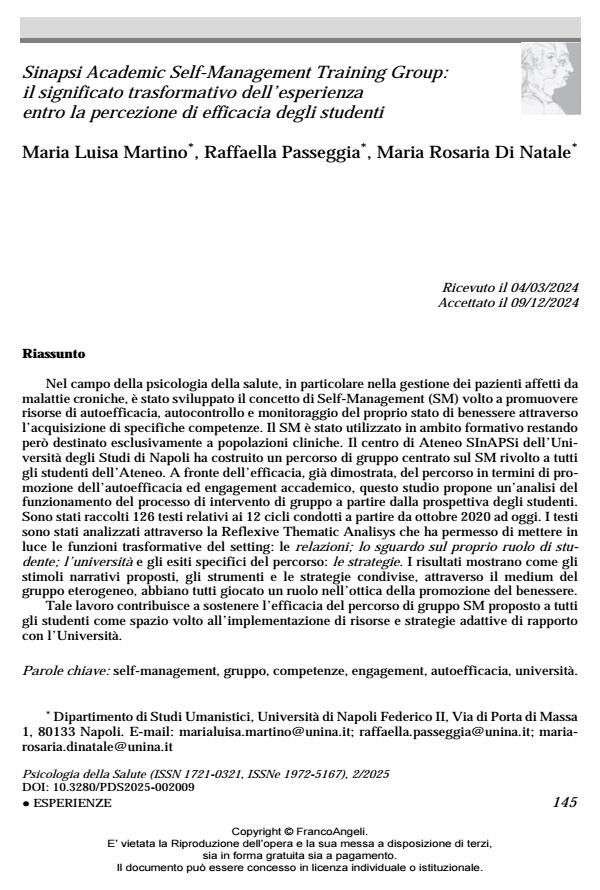Sinapsi Academic Self-Management Training Group: The Transformative Meaning of Experience in Students’ Perception of Efficacy
Journal title PSICOLOGIA DELLA SALUTE
Author/s Maria Luisa Martino, Raffaella Passeggia, Maria Rosaria Di Natale
Publishing Year 2025 Issue 2025/2
Language Italian Pages 23 P. 145-167 File size 191 KB
DOI 10.3280/PDS2025-002009
DOI is like a bar code for intellectual property: to have more infomation
click here
Below, you can see the article first page
If you want to buy this article in PDF format, you can do it, following the instructions to buy download credits

FrancoAngeli is member of Publishers International Linking Association, Inc (PILA), a not-for-profit association which run the CrossRef service enabling links to and from online scholarly content.
In Health Psychology, in particular in patients with cronic illness management, Self-Management (SM) was developed, a construct that refers to the promotion of resources in terms of self-efficacy, self-control and monitoring of one’s own well-being status through the development of specific competences. SM has been applied in educational context only with clinical populations. The SInAPSi Centre of the University of Naples developed a group training focused on the SM addressed to all the students at the university. Given its already demonstrated efficacy in terms of self-efficacy and academic engagement promotion, the present study proposed the analysis of the process of the group intervention from the students’ point of view. Since 2020, in 12 cycles of intervention, 126 texts, produced from the students were collected Sono stati raccolti 126 testi relativi ai 12 cicli condotti a partire da ottobre 2020 ad oggi. All the texts were analyzed using the Reflexive Thematic Analisys, that allowed to highlight the transformative function of the setting, namely the relationships, a gaze upon one’s own role of student, the university; and the specific outcomes of the intervention, namely the strategies. Results showed how the narrative inputs proposed, the tools and the strategies that were shared, through the medium of the heterogenous group, all played a role in the promotion of well-being perspective. This work contributed to sustain the efficacy of the SM group intervention proposed to all the students as a space aimed at implementing resources and adaptive strategies in relation to the University.
Keywords: self-management, group, competences, engagement, self-efficacy, university.
Maria Luisa Martino, Raffaella Passeggia, Maria Rosaria Di Natale, Sinapsi Academic Self-Management Training Group: il significato trasformativo dell’esperienza entro la percezione di efficacia degli studenti in "PSICOLOGIA DELLA SALUTE" 2/2025, pp 145-167, DOI: 10.3280/PDS2025-002009